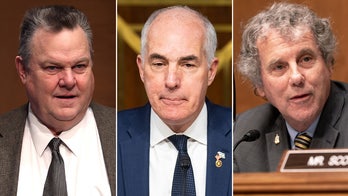The CEOs of some of the country's biggest companies are being summoned to Washington to defend claims that the health care reform law would cost them millions -- a move Republicans say amounts to intimidation.
Democratic Rep. Henry Waxman, chairman of the House Energy and Commerce Committee, on Friday fired off letters to the heads of Caterpillar, Verizon, AT&T and Deere after they and other firms reported that the health care overhaul would dig deep into their bottom lines.
Caterpillar claimed it would raise costs by $100 million in the first year and imperil coverage for its 150,000 employees and retirees. Deere estimated it would raise expenses by $150 million.
Waxman, in his letters, called these estimates a "matter of concern" and said they "appear to conflict with independent analyses" showing the law would lead to a decrease in premium costs for large companies.
Waxman called the CEOs to Washington to testify at an April 21 hearing and requested full documentation from the firms detailing how they arrived at their estimates.
But Republicans said the committee was trying to "bully" companies for speaking out against the legislation.
"Instead of interrogating America's private sector job creators, Congress should be listening to them, heeding their warnings about the effects of this deeply flawed new law, and replacing it with reforms that will help them get back to creating jobs," House Minority Leader John Boehner said in a statement.
Texas Rep. Michael Burgess, who sits on the Energy and Commerce Committee, said he's not surprised the companies are reporting negative side effects and urged his Democratic colleagues to lay off.
"The timing of the letters and the hearing and the scope of information requested looks an awful lot like an attempt to intimidate and silence opponents of Democrats' flawed health care reform legislation, which is unfortunately the law of the land," he said.
Capitol Hill isn't the only place where the firms are feeling pressure. Commerce Secretary Gary Locke, in an interview with CNBC, called the companies' statements "premature and irresponsible" last week.
The companies say they're concerned that costs will skyrocket in large part because of a provision that taxes Medicare subsidies for prescription drugs.
James Klein, president of the American Benefits Council, expressed skepticism that the companies would be exaggerating.
"Certainly no company would want to have to take that kind of accounting hit if they could at all avoid it," he said. "This does not need to become a partisan issue on either side."




